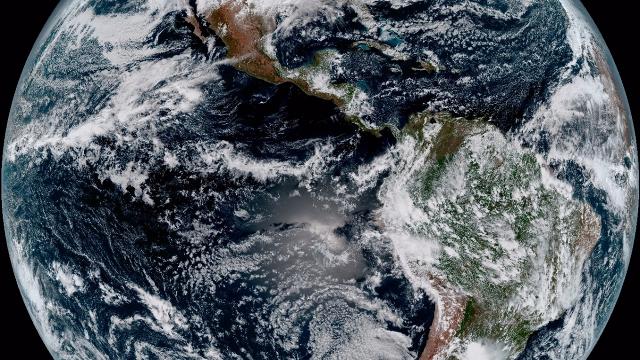As we traverse the intricate tapestry of our planet’s climate, a fundamental inquiry looms large: is it getting colder or hotter? The answers to this age-old question could illuminate the shadowy recesses of environmental uncertainty. In the 21st century, the consensus is strikingly clear — the Earth is warming. The term “global warming” encapsulates a complex web of climatological changes that extend beyond mere temperature fluctuations. It signifies a formidable phenomenon, one that delicately alters the delicate balance of ecosystems, weather patterns, and even human health.
Imagine the Earth as a colossal living organism, its skin — the atmosphere — slowly swathed in an ever-thicker quilt of greenhouse gases. As sunlight penetrates this layer, it warms the planet’s surface. Yet, the increased accumulation of carbon dioxide, methane, and nitrous oxide acts like a glass enveloping a potted plant, retaining warmth and preventing the essential heat from escaping. Like an ancient alchemist’s potion gone awry, this warming elixir carries with it an array of transformative effects, unveiling realms of disquieting futures.
At the core of global warming is the phenomenon known as the greenhouse effect. This comprehensive principle governs how solar energy reaches the Earth’s surface and is subsequently absorbed or reflected back into space. When fossil fuels combust, they release a surge of greenhouse gases, triggering an amplification of this effect. The result? An upsurge in global temperatures, leading to bewildering climatic shifts. Proponents of denial may cling to the fluctuating climate narrative, arguing that natural cycles have always dictated warmth and chill. Yet, the current trajectory is unprecedented in both its speed and intensity.
Global temperatures have swelled alarmingly, with the last few decades marking some of the warmest years on record. Scientific data displays a relentless upward trend, manifesting itself through myriad indicators such as melting polar ice, shrinking glaciers, and the frequency of extreme weather phenomena. This climatic escalation evokes an aquifer on the verge of bursting, where relentless pressure must eventually yield irrevocable consequences.
Consider the realms of biodiversity — the sheer multitude of species inhabiting our Earth, each intricately woven into ecosystems that have evolved over millions of years. Global warming disrupts this fragile tapestry, leading to habitat destruction, altered migration paths, and heightened extinction risks. Plants and animals are thrust into a race against time, where they grapple to adapt or perish under the duress of rapidly changing conditions. The intimate dance of flora and fauna is being interrupted, as if a once harmonious symphony faces dissonance. The cessation of a single note can reverberate throughout the entire performance.
The seas, too, are not immune to the thermal upheaval. Rising temperatures not only warm ocean waters but also induce the phenomenon of ocean acidification. Increased CO2 gives rise to carbonic acid, which can corrode coral reefs and compromise marine biodiversity. Reefs act as vibrant cities, bustling with life and diverse ecosystems, yet they are straining under the twin burdens of heat and acidification. This marine crisis is a siren’s call, warning of impending ecological demise that could reshape our oceans forever.
In understanding the ramifications of global warming, the specter of extreme weather events emerges with alarming clarity. The frequency and intensity of hurricanes, heatwaves, droughts, and floods have escalated significantly. These events occur with the ferocity of a tempest unbound, wreaking havoc on communities and displacing populations. They stand as pinpoints illuminating the urgent necessity for climate action, as those on the frontlines bear the brunt of nature’s fury.
A peculiar facet of global warming is the psychological toll it inflicts on human consciousness. As individuals huddle under the complex tapestry of news and ideologies surrounding climate change, the existential dread can manifest into what some refer to as “eco-anxiety.” This phenomenon underscores a profound sense of helplessness, as people grapple with the consequences that loom over future generations. Such feelings accentuate the urgency of communal resilience and proactive initiatives to combat environmental degradation.
Climate change does not operate in isolation; its effects ripple across socio-economic dimensions. The most vulnerable populations, often residing in impoverished regions, face disproportionate repercussions. Agriculture suffers as crop yields plummet due to altered rainfall and agricultural zones shift. Food insecurity arises, leading to intercontinental migration and amplified geopolitical tensions. The mirage of stability dissolves, revealing the interconnectivity of climate and human livelihood.
So, what does global warming mean for us as stewards of this planet? It signifies a clarion call to galvanize collective action. From innovative renewable energy solutions to conservation efforts, the path forward bespeaks an imperative transformation. Highways of change must crisscross cultures, ideologies, and disciplines, forging unity in the face of a shared challenge. The robustness required to address climate change can be akin to the resilience of kale that thrives in winter—a determined testament to nature’s tenacity in overcoming adversity.
Ultimately, the question of whether it is getting colder or hotter leads us to a profound understanding of the intricacies of global warming. It’s more than a simple dichotomy; it is a reflection of the pressing challenges we face. Now is the time to act—act with determination, clarity, and unity. As stewards of the Earth, it is our responsibility to safeguard its legacy for generations to come, ensuring that the narrative we write is one of reconciliation, resilience, and hope.







